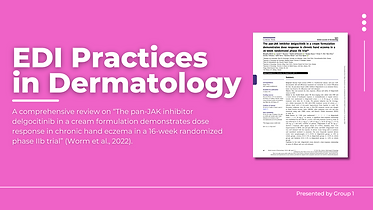

Research Excellence
This course explores how equity, diversity, and inclusion (EDI) principles enhance the quality and impact of medical science research. Through interactive seminars and applied assignments, students examine the role of diverse research teams, study populations, and equitable research practices. The course empowers students to critically evaluate research through an EDI lens and develop practical strategies to foster inclusive excellence in health research environments.
Meet the Prof
Course Objectives
01
Equity, Diversity, and Inclusivity Statement
I developed a personal EDI statement that reflects my values and commitment to fostering inclusive and equitable research environments. This assignment challenged me to reflect critically on my own biases, positionality, and the role I play in promoting diversity within medical science. I revised and expanded my statement over time based on feedback and new insights. The final version outlines how I plan to meaningfully integrate EDI principles into my future research and collaborative practices.


02
Indigenous Research Reflection
I completed a reflection on Indigenous research approaches, which encouraged me to critically examine the differences between Western and Indigenous ways of knowing. This process deepened my understanding of how colonial legacies continue to shape research practices and highlighted the importance of community engagement, reciprocity, and respect in working with Indigenous populations. Through this reflection, I developed a stronger awareness of my responsibilities as a researcher to uphold ethical and culturally sensitive practices that honor Indigenous knowledge systems.
03
EDI in Dermatology
Our group project explored EDI in dermatology, focusing on how structural bias and underrepresentation affected diagnosis and treatment for patients with skin of colour. We examined disparities in medical education resources, diagnostic accuracy, and access to care. Through this project, I developed a deeper understanding of how inclusive practices in dermatology could improve patient outcomes and reduce health inequities. It also reinforced the importance of diverse representation in clinical imagery and medical training.


Reflection
1
What I learned
Through this course, I gained a deeper understanding of how EDI are essential to achieving excellence in medical research. I learned how systemic bias, lack of representation, and structural inequities can shape research outcomes and limit the generalizability of scientific findings.
2
Skills I developed
I developed critical skills in evaluating research through an EDI lens, crafting inclusive research statements, and engaging with diverse perspectives in both individual and collaborative work. I also strengthened my ability to reflect on positionality and apply ethical, culturally responsive approaches to research design.
3
How will I use it in the future
Moving forward, I will use these insights to design more inclusive studies, advocate for diverse representation in research teams and participant samples, and apply EDI principles in both academic and clinical settings to help foster equitable outcomes for all populations.
